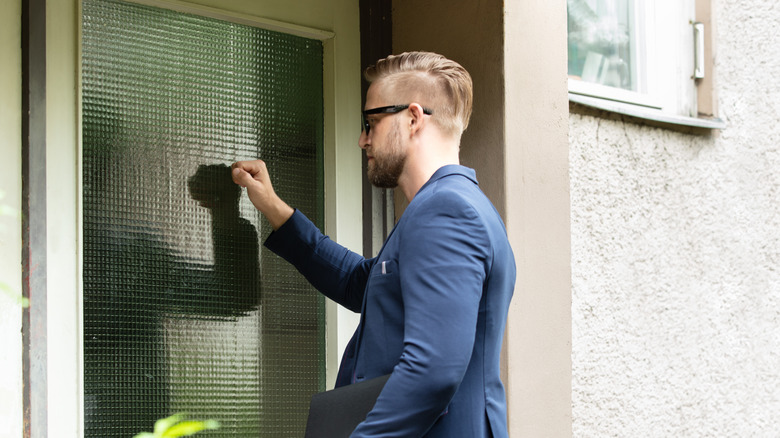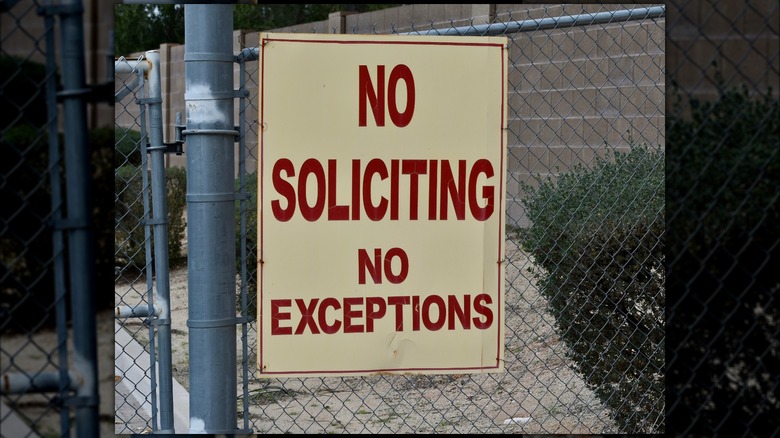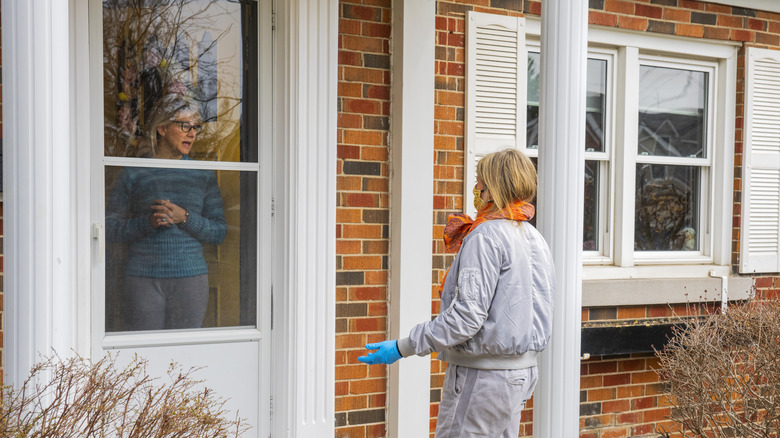These Are Your Legal Rights If Someone Ignores Your 'No Soliciting' Sign
Navigating a world where capitalism and consumerism rule the roost is arduous, and the incessant pitches from door-to-door salespeople only add fuel to the fire. You'd think putting up a "No Soliciting" sign should be a loud enough message to all cold callers to keep off your property. Unfortunately, that isn't the case, and plenty ignore the signs and ring the bell anyway. Fret not, though, as you have the right to report the pesky solicitors to the authorities, but local laws will affect the outcome. You can also press trespassing charges and they may be fined for ignoring your "No Soliciting" sign.
There's quite a bit of nuance involved in enforcing these signs, thanks to the myriad of HOA guidelines, municipal rulings, state laws, and constitutional rights. The First Amendment protects the right to speech (and solicitation, in seriatim) of commercial sellers and proselytizers. Thus, the Supreme Court has outlawed the blanket bans imposed by communities and local bodies on canvassers in line with federal law, in addition to reasoning that it deprives individual homeowners of their right to attend to peddlers. At the same time, it has allowed for rules regulating solicitation timings and the individual's right to put up signs and have them administered, provided they are in line with certain guidelines.
Post clear and visible No Soliciting signs
While it isn't illegal for canvassers to approach households, they can be deterred using no solicitor signs, with the caveat that the deterrence will differ per the local regulations. For instance, certain Colorado municipalities, like Fort Collins, have declared the flouting of these signs unlawful despite the lack of a state-wide law. The same doesn't hold for Georgia, though, as it's admissible to ignore the sign. Moreover, for the signs to hold legal weight, they must be placed prominently— like at the home entrance, in the driveway, or any other place it's hard to miss. They won't usually stick if they're only at the neighborhood's access gate.
No solicitor signs must be phrased lucidly and retouched periodically to be effective. Otherwise, some unwanted visitors may treat it as an old-house remnant that new homeowners forgot to replace, per a KSLTV interview. Also, the signage should be a particular size, as dictated by the local regulations. For example, Henderson, Nevada requires a minimum height of one and a half inches for such notices. Despite your efforts, however, some charity organizations, religious groups, or permit-holding, licensed businesses can still legally choose to disregard the sign. To learn the regulations about posting yard signs applicable to your circumstances, consult the Municode Library.
Solicitors becoming trespassers
Depending on the city laws, pushy sellers can be given various punishments, from penalties to prison time. To illustrate, several Utah cities impose a $1,000 fine or six months of jail time (or both) for flouting the rules. However, even if the county rules don't insist on the obeyance of no solicitor notices, you can still put up signages and communicate verbally to the persistent knockers to knock it off. If they refuse, either call 911 to report aggressive behavior or the local non-emergency police line (if non-threatening), and they'll issue a warning for trespassing. A repeat offense will have them arrested. You can also take up the issue with their management to stop the unruly behavior.
Alternatively, swapping out "No Solicitor" signs for "No Trespassing" works, too, especially if you're looking to keep preachers and charities at bay. To do so, either paint 50 square inch-sized, bright orange signage at every 200 feet interval or put up a fence. Another hilarious approach gaining ground is where households post a notice stating their charges for listening to the seller's pitch. Surprisingly, it's a valid contract and can dissuade canvassers from hounding you, as attorney Juli Blanch tells KSLTV.


